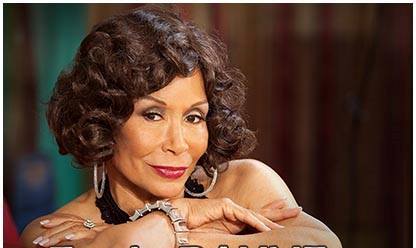HELLO AMERICA!—While so many music and acting greats of the 70s are have quietly retired or subtlety looking around for the perfect nest to spend their declining years in the entertainment business, still beautiful and gifted singer-actress and former TV host Freda Payne is busy planning her performing dates around the world.
“I was born to perform on a stage, the camera and that’s what I’ve been lucky enough to do for all these years!” She says with that infamous, joyous laugh of hers. Born September 19, 1942 in Detroit, Michigan, Freda developed a love of music when hearing singers such as Ella Fitzgerald, Billie Holiday and Sarah Vaughan. “These women were master performers, creating and establishing their own identifying sound. Every record they came out with, I was one of the first in line to buy. After all, they were the best!”
Her own career blossomed as she began singing radio commercial jingles which brought her to the attention of music-heavyweights. Berry Gordy, Jr. was excited about possibly signing her to his then very young record company Motown, while Duke Ellington signed her as the featured singer with his orchestra for two nights in Pittsburgh. Afterwards, Ellington offered her a 10-year contract. In both cases, Freda’s mom turned them down.
It was during the 60s that Freda established herself as a first class jazz vocalist, touring the nation with both Quincy Jones and Bill Cosby. She was hot and wisely took advantage of it by issuing a jazz/big band-based album in 1963, “After the Lights Go Down Low and Much More!”
Later, three years later, “How Do You Say I don’t Love You Anymore.” Then, of course, she knocked millions dead as guest performer on shows such as David Frost, Merv Griffin and Johnny Carson. It wasn’t until Payne signed on to the “Invictus” label in 1969 (headed by longtime friends/former Motown songwriters/producers Lamont Dozier, Eddie Holland and Brian Holland) and issued the fine album “Band of Gold” that she scored her break-through hit single, the album’s title track which peaked at number three in the U.S. and topped the chart in the U.K. in 1970.
Although Freda never enjoyed another hit as substantial as “Band of Gold,” several other successful records followed in the early 70s: “Cherish What’s Dear to you,” “Deeper & Deeper,” “You Brought the Joy,” Further albums followed throughout the 70s, including such titles as “Contact,” “Payne & Pleasure,” “Out of Payne Comes Love,” “Supernatural High” which all failed to make an impression on the charts. Payne then switched her attention from music to TV, as she hosted her very own (yet short-lived) talk show in 1981, “Today’s Black Woman.”
The 90s saw Freda return to music, as such albums as “An Evening with Freda Payne” and “Christmas with Freda & Friends” were issued, while Payne also landed roles in such movies as “Private Obsession,” “Sprung,” and “Ragdoll.” Payne continued to balance an acting and music career during the early 21st century, as she appeared in the 2000 Eddie Murphy comedy the “Nutty Professor II: The Klumps.” She also appeared in the made-for-TV movie “Fire & Ice,” plus issued an all-new album in 2001, “Come See About Me.”
Around the same time, several hits compilations were issued, including such titles as Band of Gold: “The Best of Freda Payne,” “Unhooked Generation: The Complete Invictus Recordings,” and “The Best of Freda Payne: Ten Best Series.” Impulse re-released “After the Lights Go Down Low” in 2005, but failed to add any bonus material. She returned in 2007 with the album “On the Inside,” which was a collection of her most personal songs. In 2009, she re-entered public consciousness with an appearance on “American Idol,” performing her most iconic song. In June 2014, she released a jazz-influenced studio album entitled “Come Back to Me Love.”e.






